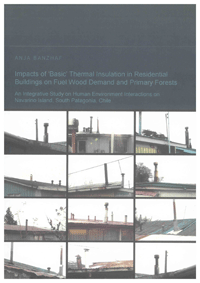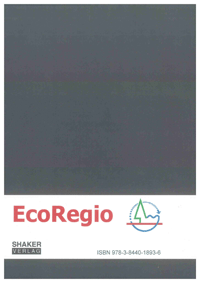
Shop : Details
Shop
Details
39,80 €ISBN 978-3-8440-1893-6Softcover226 pages37 figures336 g21 x 14,8 cmEnglishReference book
May 2013
Anja Banzhaf
Impacts of 'Basic' Thermal Insulation in Residential Buildings on Fuel Wood Demand and Primary Forests
An Integrative Study on Human Environment Interactions on Navarino Island, South Patagonia, Chile
Despite harsh climate conditions, the majority of residential buildings in the extreme south of Chile lack suitable thermal insulation. Thus, energy consumption for space heating is high, and buildings are frequently characterized by uncomfortable and unhealthy indoor environments. Fuel wood plays a fundamental role as combustible for heating in southern Chile, and fuel wood extraction often causes or contributes to the degradation of local primary forests. Thus, there is a conflict between the protection of the diversity and integrity of Patagonian forest ecosystems and the use of wood as a locally available resource for space heating.
The principal aim of this study is to analyze whether this conflict could be reduced with ‘basic’ thermal insulation in residential buildings on Navarino Island. The thesis contains two related parts: First, the testing of several hypotheses regarding the impact of ‘basic’ thermal insulation on the fuel wood demand of Navarino residential buildings. Second, a set of wider observations that contribute to additional related research questions. The key hypotheses argue that it is possible to identify profitable thermal insulation measures for Navarino Island residential buildings, and that with these ‘basic’ measures more than 30 % fuel wood savings can be achieved per building. If higher fuel wood demand reductions are to be reached, I hypothesize that considerable financial means are necessary.
In order to test the hypotheses, indoor temperature and humidity measurements were conducted, and possible fuel wood savings and profitability of ‘basic’ thermal insulation measures are calculated. In addition, local inhabitant perceptions of thermal building quality and comfort and their willingness to invest into building retrofits are examined. To answer further research questions, this study is set into the context of the Environmental Kuznets Curve for deforestation, and discussed in relation to general considerations about energy efficiency, fuel poverty, and the rebound effect.
The results of my research clearly show that the majority of Navarino civil residential buildings is insufficiently insulated. Despite high fuel wood consumption, indoor temperatures are low and indoor humidity is high. Navarino inhabitants perceive this living environment as uncomfortable; however, investments into thermal building insulation are not their priority. Thus, subsidies are required for speeding up the implementation of thermal building retrofits on Navarino Island.
Depending on underlying assumptions, up to 45 % fuel wood savings per building are possible due to ‘basic’ thermal insulation measures. However, a considerable proportion of potential energy savings is expected to be offset by the rebound effect (e. g. due to the increase of indoor temperatures). Hence, ‘basic’ thermal building retrofits can lead to the increase of energy services, improve inhabitant health and well-being, and moderately reduce the fuel wood demand. For the achievement of higher fuel wood savings, far more complex energy efficiency measures and consumer education and information are necessary.
The principal aim of this study is to analyze whether this conflict could be reduced with ‘basic’ thermal insulation in residential buildings on Navarino Island. The thesis contains two related parts: First, the testing of several hypotheses regarding the impact of ‘basic’ thermal insulation on the fuel wood demand of Navarino residential buildings. Second, a set of wider observations that contribute to additional related research questions. The key hypotheses argue that it is possible to identify profitable thermal insulation measures for Navarino Island residential buildings, and that with these ‘basic’ measures more than 30 % fuel wood savings can be achieved per building. If higher fuel wood demand reductions are to be reached, I hypothesize that considerable financial means are necessary.
In order to test the hypotheses, indoor temperature and humidity measurements were conducted, and possible fuel wood savings and profitability of ‘basic’ thermal insulation measures are calculated. In addition, local inhabitant perceptions of thermal building quality and comfort and their willingness to invest into building retrofits are examined. To answer further research questions, this study is set into the context of the Environmental Kuznets Curve for deforestation, and discussed in relation to general considerations about energy efficiency, fuel poverty, and the rebound effect.
The results of my research clearly show that the majority of Navarino civil residential buildings is insufficiently insulated. Despite high fuel wood consumption, indoor temperatures are low and indoor humidity is high. Navarino inhabitants perceive this living environment as uncomfortable; however, investments into thermal building insulation are not their priority. Thus, subsidies are required for speeding up the implementation of thermal building retrofits on Navarino Island.
Depending on underlying assumptions, up to 45 % fuel wood savings per building are possible due to ‘basic’ thermal insulation measures. However, a considerable proportion of potential energy savings is expected to be offset by the rebound effect (e. g. due to the increase of indoor temperatures). Hence, ‘basic’ thermal building retrofits can lead to the increase of energy services, improve inhabitant health and well-being, and moderately reduce the fuel wood demand. For the achievement of higher fuel wood savings, far more complex energy efficiency measures and consumer education and information are necessary.
Keywords: residential buildings; thermal insulation; Navarino Island; Chile; fuel wood; forest management; energy efficiency; thermal building insulation; energy efficiency scenarios; destruction of primary forests
Available online documents for this title
You need Adobe Reader, to view these files. Here you will find a little help and information for downloading the PDF files.
Please note that the online documents cannot be printed or edited.
Please also see further information at: Help and Information.
Please also see further information at: Help and Information.
| Document |  | Document | ||
| Type |  | |||
| Costs |  | 29,85 € | ||
| Action |  | Purchase in obligation and download the file | ||
| Document |  | Table of contents | ||
| Type |  | |||
| Costs |  | free | ||
| Action |  | Download the file | ||
| Document |  | Abstract | ||
| Type |  | |||
| Costs |  | free | ||
| Action |  | Download the file | ||
User settings for registered online customers (online documents)
You can change your address details here and access documents you have already ordered.
User
Not logged in
Export of bibliographic data
Shaker Verlag GmbH
Am Langen Graben 15a
52353 Düren
Germany
Am Langen Graben 15a
52353 Düren
Germany
Mon. - Thurs. 8:00 a.m. to 4:00 p.m.
Fri. 8:00 a.m. to 3:00 p.m.
Fri. 8:00 a.m. to 3:00 p.m.
Contact us. We will be happy to help you.



